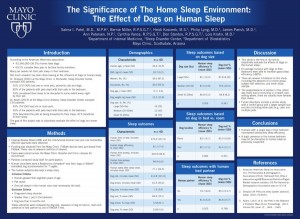File this one under the “aww-some” news category.
Those with four-legged bedroom guests can rest assured that quality slumber usually remains a loyal companion, two studies found after analyzing data captured from Kansas City-based FitBark devices.
The Mayo Clinic Center for Sleep Medicine conducted the first of two studies to explore the impact of pets on human health, and in this case, the effects they have on their caretakers’ quality of sleep. The studies both tapped data collected from FitBark’s wearable tech device that attaches to a dog’s collar to gather their activity information.
The first study revealed that 41 percent of respondents believed that having a pet in the bedroom leads to better sleep, whereas 20 percent of respondents reported sleep disturbances. So it seems that, according to the study, pooches tend to make people feel comfy and secure.
FitBark CEO Davide Rossi said that the study bucks the conception that dogs tend to disturb their owners while sleeping.
“The results are that pets aren’t as disruptive in the bedroom as we previously thought,” Rossi said. “So that’s fantastic news for dog owners.”
The second Mayo Clinic-led study was to provide health care providers and dog owners with data on breeds of common dogs that tend to sleep well. Researchers theorized that the better a dog sleeps, the better the human can sleep.

The study found that of the 18 common breeds it analyzed, the dogs that may best enhance their humans’ sleep are the Siberian Husky, Boxer, Golden Retriever and Labrador Retriever. It also discovered that, in general, sleep efficiency was better among larger dogs in their adult and senior years. Sleep efficiency is the ratio of total sleep time in an evening compared to the total amount of time spent in bed. The median sleep efficiency in this study was around 86 percent, which is similar to the sleep efficiency in humans.
“The conclusion of this study isn’t that if you can’t sleep well you shouldn’t get a Pomeranian,” Rossi said. “The conclusion is that if you deeply care about the quality of your sleep, there are a few types of dogs you could look into rather than others. It’s not to bash any breed in particular — it’s to develop some knowledge where their genetics went.”
In addition to sharing fun news with its thousands of fans around the world, the study offered FitBark further validation that its device has serious clinical applications. A Sprint Accelerator graduate, Fitbark now works with more than 30 different research institutions around the world, offering scientists access to devices and a deep pool of doggy data.
FitBark devices are already being sold on Amazon.com and in Target and Best Buy stores. To expand its footprint in the next year, Rossi said FitBark will focus on cultivating partnerships with insurance, pharmaceutical and food companies.
“Our data is what they’re thrilled about,” he said. “It’s our data and a very active and loyal user base that they’ve been fantasizing about until now.”
Learn more about the firm with the video.




































